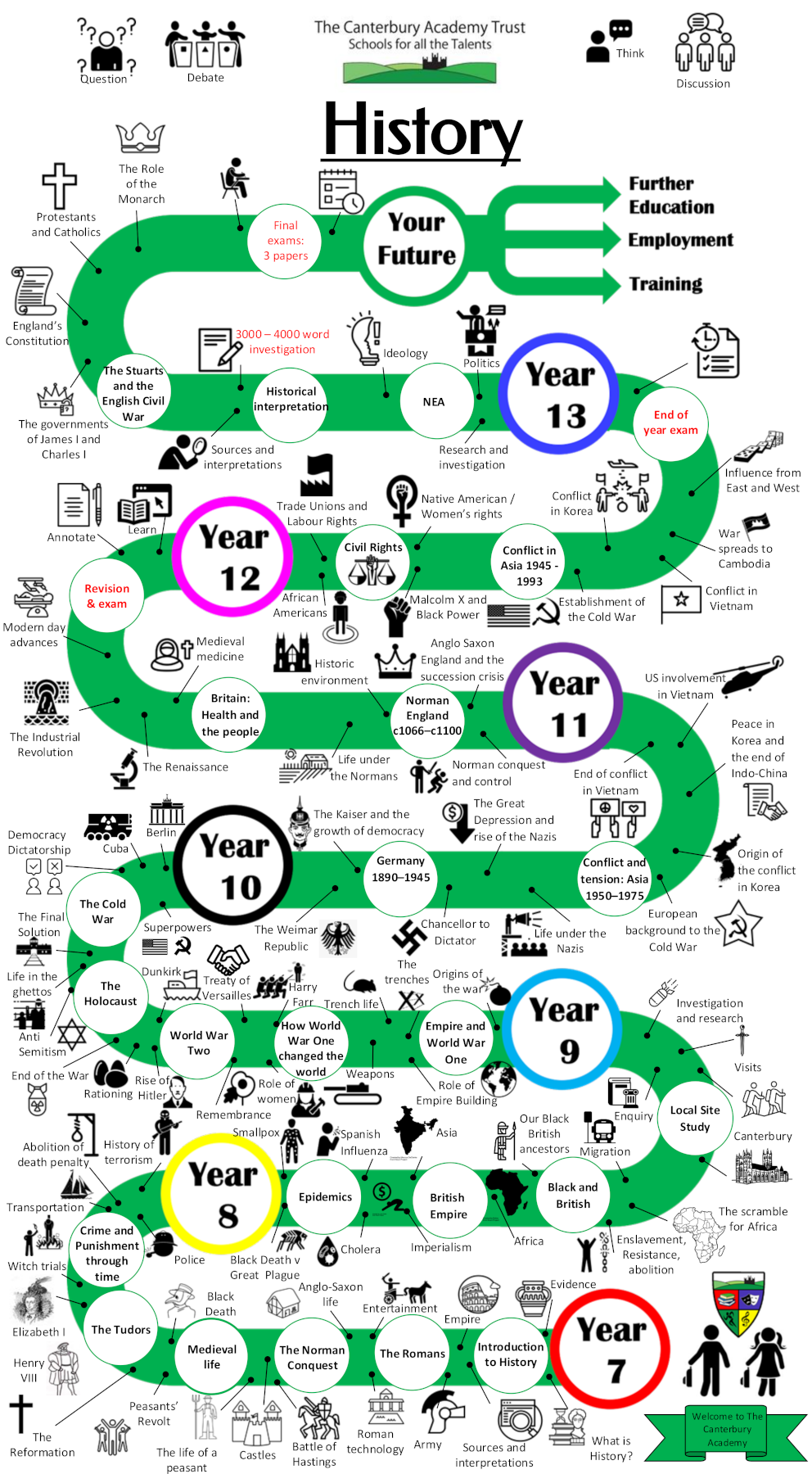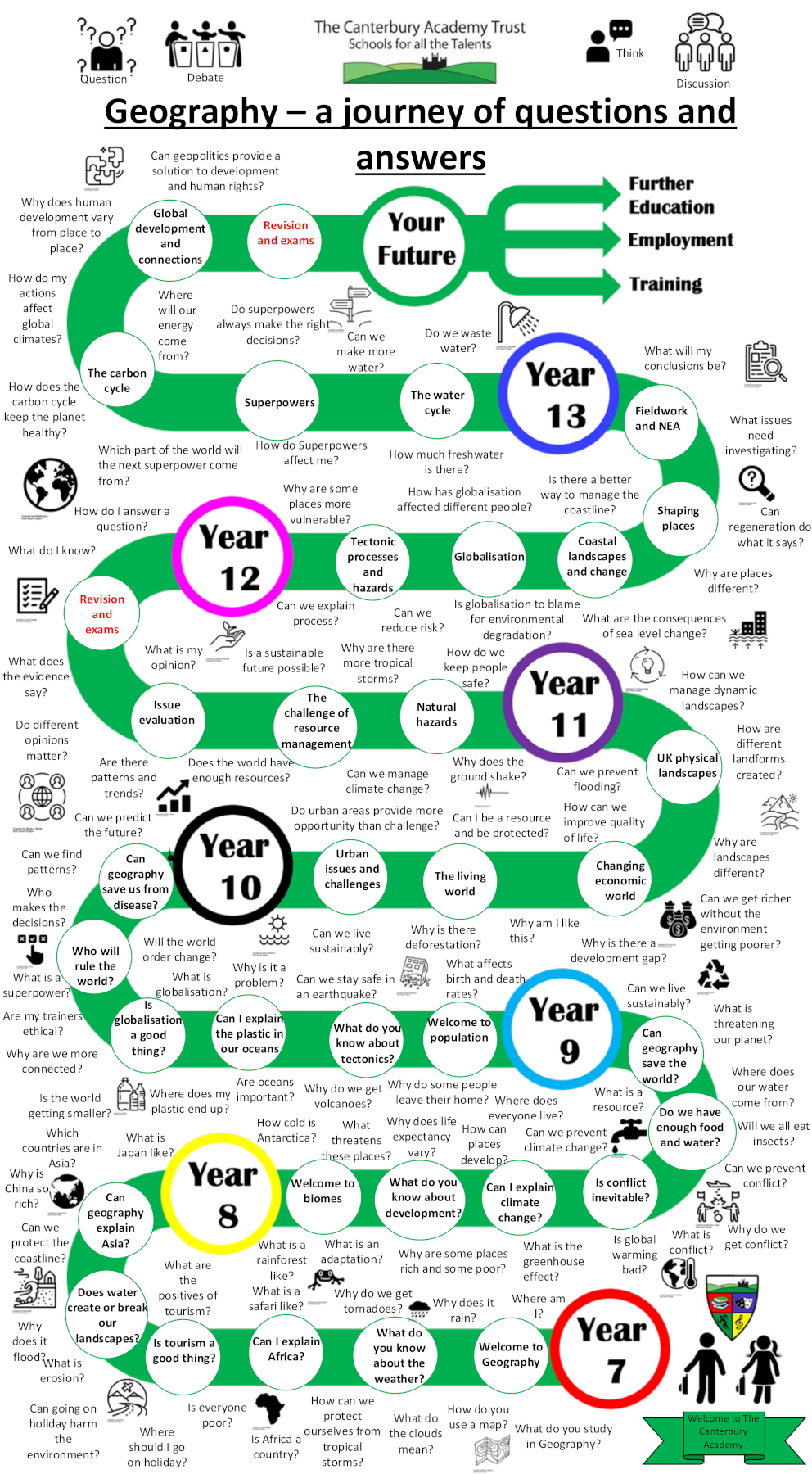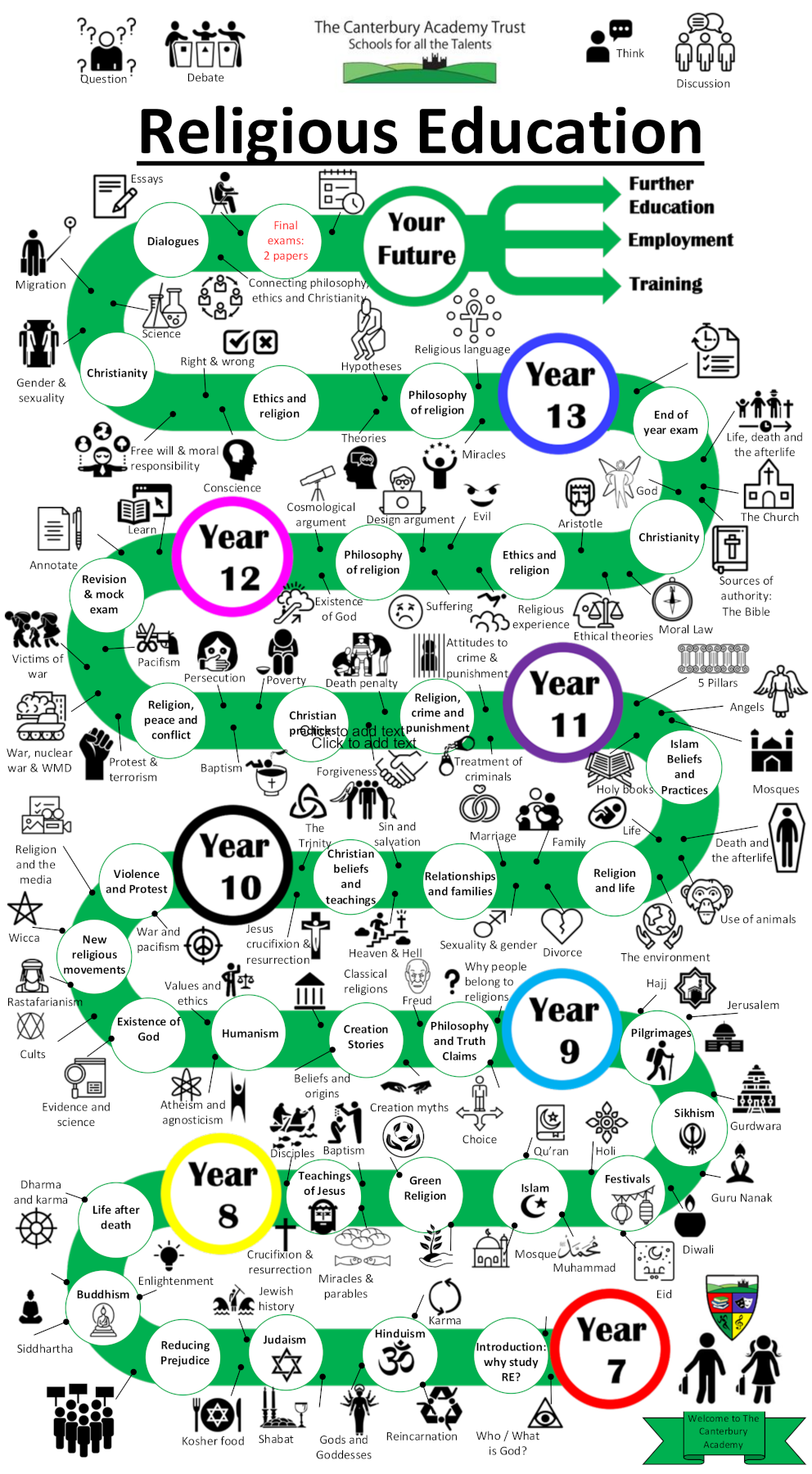Why Study History?
History is a crucial subject to support a student’s development and understanding both of the past but also the world they currently live in. History will help students to gain critical thinking skills which are becoming increasingly valuable in the modern world such as analysing and evaluating information, considering motive and accuracy. These skills will be practiced through studying events from British history as well as history of other countries and peoples around the world, from the Ancient Egyptians to modern day.

The purpose of studying History at The Canterbury Academy is…
- Learn to analyse and evaluate sources of information, such as sources and interpretations.
- Develop your ability to construct logical and coherent arguments which can help you gain confidence in expressing your opinion.
- Develop students’ perspectives of the past and present by learning the interconnectivity of past events with current events.
- Develop and support students’ identity and sense of self through a robust and wide-ranging curriculum which focuses on history from over 2500 years and spanning countries and peoples from around the world.
- To be inspired to become more independent learners. Sparking interest in the past and a love of learning will combine to support our learners to become independent researchers of the past. .
Recommended Reading
- Horrible Histories series – T Deary
- 1066 (I Was There) – J Eldridge
- Anglo Saxon Boy – T Bradman
- Empire’s End: A Roman Story – L Rasheed
- Crusade – E Laird
- I Survived The Black Death, 1348 – L Tarshis
- Black and British – D Olusoga
- War Horse – M Morpurgo
- Hitler Stole Pink Rabbit – J Kerr
See our learning journey
Our students begin their journey in Year 7 with a transitional unit focusing on key historical terms and skills which will ensure all students begin their journey with those important tools. Students will then progress through Years 7 to 9 with a journey across the last 2500 years, investigating key time periods like the Middle Ages or themes such as epidemics or Black and British.
At GCSE students then follow the AQA specification, studying content from the four units of; Democracy and Dictatorship in Germany, Conflict and Tension in Asia, Norman Conquest of England, and Health and the people. Students who choose to continue to our popular A Level will then get the opportunity to further their study of Asia as well as; the English Civil War, American Civil Rights, and another course work unit of their choosing.
Students in Years 7 to 9 will be assessed through a mixture of in-class extended writing assessments and formal examinations based upon historical second order concepts such as significance/cause and consequence. Years 10 to 13 will follow a carefully selected variety of practice exam questions from previous papers as well as mock examinations. This will be in addition to regular updates on students’ attitude to learning and engagement with homework.
Why Study Geography?
The Geography department intends to inspire young people to be inquisitive and passionate about the world and their place in it. We want students to become more curious and questioning of the places around them. We want students to become more informed, analytical, and reflective global citizens. Our curriculum at each key stage develops both knowledge and academic skills for the next stage in the students’ academic journey.
The purpose of studying Geography at The Canterbury Academy is…
- Analytical and evaluative skills.
- Sense of place from the local to the global.
- Cartographical and graphical skills.
- Develop an appreciation and understanding of the dynamics of cultures, economies, and societies through the study of Human Geography.
- Develop an appreciation and understanding of our landscapes and environments through the study of Physical Geography.
- Develop a deeper knowledge and understanding of how and why the world is changing at local and global scales.
Recommended Reading
- ‘The boy who cycled the world’ – Alastair Humphreys
- ‘Touching the Void’ – Joe Simpson – Scholastic version
- ‘Horrible Geography’ – Anita Ganeri
- Ladybird Expert series:
- ‘Climate Change’ – Charles, Prince of Wales
- ‘Plate Tectonics’ – Iain Stewart
- ‘Evolution’ – Steve Jones.
- ‘Refugee boy’ – Benjamin Zephaniah.
- ‘No-one is too small to make a difference’ – Greta Thunberg
- ‘World without Fish’ – Mark Kurlansky
- ‘A dip in the ocean’ – Sarah Outen
- ‘How bad are bananas’ – Mike Berners-Lee.
See our learning journey
At KS3 students undertake a different topic each half term. Students begin by considering their sense of place and developing some key skills such as map skills. As the topics develop students are also given the opportunity to further develop their analytical skills. Topics are designed to develop the student’s curiosity and engagement with the subject. Students cover topics and themes that engage them with relevant and up to date geography.
These topics, with some links to further study at KS4 and KS5, will allow students to appreciate the world around them and become more informed global citizens.
At KS4 students study alternating topics from physical and human geography set out by the exam board (AQA). This alternation occurs so it is easier for students to make synoptic links and understand that topics do not sit in discreet bubbles but share concepts and connections. Up to date case studies and local links are also used to stimulate engagement and interest. Students are given opportunities to extend and challenge their thinking in readiness for the next academic stage of Geography.
At KS5 students are exposed to further real-life examples with an emphasis on current up to date relevancy. Throughout the key stages students explore topics with extended writing to develop their geographical arguments.
Why Study Religious Education?
Studying RE at The Canterbury Academy enables our students to look at a wide variety of the different religious beliefs, values and practices found in the UK today. A key strength to studying RE is found not just in learning about the contrasting viewpoints and traditions in British Society today, but also in learning from them. As well as enriching a student’s own view on life, RE teaches core evaluating skills to consider and debate many of life’s deeper questions as well as complementing many of the other subjects which require an ability to think critically.
The purpose of studying Religious Education at The Canterbury Academy is…
Learning about religion, philosophy and ethics which will support students in adding:
- Knowledge. Introducing our students to a wide variety of different beliefs, values and practices found in the UK.
- Describing skills through exploring similarities and differences within key religious beliefs.
- Explaining. Examining how different religious traditions celebrate culture and rites of passage.
Learning from religion, philosophy and ethics which will develop:
- Critical thinking skills. Developing students who critically assess different responses to ethical issues.
- Evaluation skills. Challenging students to evaluate the role of religious beliefs in influencing society today.
- Reasoning skills. Enabling students to consider more deeply philosophical questions on life after death, evil and suffering, and the nature of existence.
- Debating skills. Students are encouraged to explore their own moral compass and find their voice in discussions and debates.
Recommended Reading
- The Illustrated Bible: from Creation to Revelation (DK)
- Introducing Islam – Sardar & Malik
- Introducing Hinduism – Lal & Loon
- World Religions – John Bowker
- The Religions Book (DK)
- The Colour of Justice – Richard Norton-Taylor
- The Other Side of Truth – Beverley Naidoo
See our learning journey
Our students begin their journey in Year 7 with a transitional unit focusing on key RE terms and skill recognizing that in primary, some prior understanding will vary. This enables students to begin their further study with a core shared understanding. Students will then progress through Years 7 and 8 with a journey that introduces the six world religions starting with Hinduism through to Sikhism. In between these religious units there are topical ethical issues that arise where students respond to such questions as prejudice, life after death, the role of religion today in environment and the need for festivals and celebrations.
In Year 9, RE becomes an option subject where the learning journey shifts to looking at some deeper questions on what brings about new religious movements, secular humanism and core philosophical questions that will lead to ethical themes that provide a good foundation for GCSE ethical themes.
Students in Years 7 to 9 will be assessed through a mixture of in class extended writing assessments, based upon improving skills in identifying, describing, and explaining beliefs and practices as well being able to evaluate different viewpoints on these.
Years 10 to 13 will follow a carefully selected variety of practice exam questions from previous papers as well as mock examinations in the hall. This will be in addition to regular updates on students’ attitude to learning and engagement with homework.
Meet the Humanities Department
| Mrs C Horii | Teacher of Humanities, Director of Teaching and Learning – Humanities |
| Mrs V Butler | Teacher of Humanities – Senior Vice Principal |
| Mr T Fox | Teacher of Humanities – Head of the Academic Pillar |
| Mr G Spencer | Teacher of Humanities – Head of Year 12 |
| Mr D Matthews | Head of History |
| Mrs N Taylor | Head of Geography |
| Mr J Oliver | Head of RE |
| Mrs K Brown | Key Stage 3 Geography Lead |
| Mr B Fairweather | Teacher of Humanities |
| Mr L Jones | Teacher of Humanities |
| Mr J Millard | Teacher of Humanities |
| Mrs A Booth | Teacher of Humanities |
| Mr M Khan | Teacher of Humanities |
| Miss E Holman | Teacher of Humanities |
Courses offered at KS4 and KS5
Key Stage 4
- GCSE History – AQA
- GCSE Geography – AQA
- GCSE Religious Studies – AQA
Key Stage 5
- A Level History – OCR
- A Level Geography – Edexcel
- A Level Religious Studies – AQA




